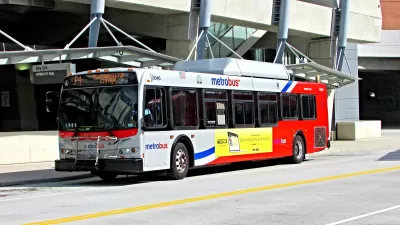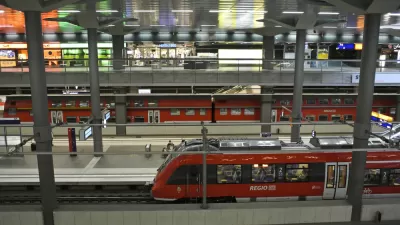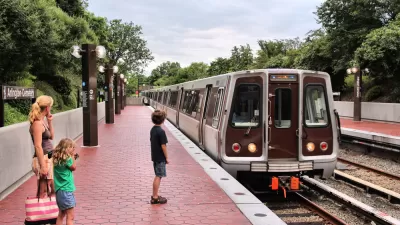D.C. Metro has a plan to reduce carbon emissions and energy consumption by building to LEED green building standards and buying electric buses.

"The Washington Metropolitan Area Transit Authority (WMATA) introduced its first Energy Action Plan to reduce energy use, greenhouse gas emissions and long-term operating costs," reports Katie Pyzyk.
The energy action plan calls for electric buses and new LEED-certified facilities, requiring a five-year investment of $65 million. The agency plans to redesign its Potomac Yard Metrorail station in Alexandria, Virginia to be the first-ever LEED-certified transit station. That station is proximate to the future location of Amazon's second headquarters.
The WMATA is pitching the Energy Action Plan as an investment that will pay long-term dividends in cost savings--$16 million in energy costs savings each year, "and another $13 million in savings on operations and maintenance by 2025," according to Pyzyk.
FULL STORY: DC's transit agency announces Energy Action Plan

Maui's Vacation Rental Debate Turns Ugly
Verbal attacks, misinformation campaigns and fistfights plague a high-stakes debate to convert thousands of vacation rentals into long-term housing.

Planetizen Federal Action Tracker
A weekly monitor of how Trump’s orders and actions are impacting planners and planning in America.

In Urban Planning, AI Prompting Could be the New Design Thinking
Creativity has long been key to great urban design. What if we see AI as our new creative partner?

King County Supportive Housing Program Offers Hope for Unhoused Residents
The county is taking a ‘Housing First’ approach that prioritizes getting people into housing, then offering wraparound supportive services.

Researchers Use AI to Get Clearer Picture of US Housing
Analysts are using artificial intelligence to supercharge their research by allowing them to comb through data faster. Though these AI tools can be error prone, they save time and housing researchers are optimistic about the future.

Making Shared Micromobility More Inclusive
Cities and shared mobility system operators can do more to include people with disabilities in planning and operations, per a new report.
Urban Design for Planners 1: Software Tools
This six-course series explores essential urban design concepts using open source software and equips planners with the tools they need to participate fully in the urban design process.
Planning for Universal Design
Learn the tools for implementing Universal Design in planning regulations.
Appalachian Highlands Housing Partners
Gallatin County Department of Planning & Community Development
Heyer Gruel & Associates PA
Mpact (founded as Rail~Volution)
City of Camden Redevelopment Agency
City of Astoria
City of Portland
City of Laramie





























